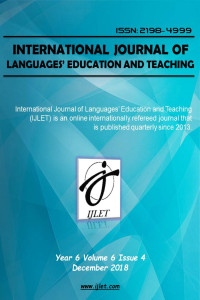Öz
How exactly can a translator reproduce a poem? Can a translation translate the feelings conveyed in the original? Whether a translation of a poem can be successful or not we will analyze with "Muhammad's Song", which is a Sturm und Drang poem by Goethe written around 1772 and translated into Turkish by Senail Ozkan. This work deals with the poem of Goethe to the Prophet Muhammad in translation by the translator Senail Özkan. In addition to the explanation of the translation of the poems, we will begin by addressing the problem of poetic translation. The relationship of Goethe to Islam is presented and the reasons for writing the poem are discussed. In the present work, the areas are first entangled both theoretically and finally also empirically: Here we will compare the original German poem of Goethe with its translation into Turkish by Senail Özkan and possibly give translation options. Attention is paid to whether, in addition to the information of the original, the feelings were conveyed to the reader correctly. Whether the aesthetic function contained in Goethe's poem was also translated into Turkish is debated in this work. The translation of the poems is therefore characterized by a poetic focus, which should also be found in the translation. By way of example, the empirical study presented here is intended to contribute to comparative translations.
Anahtar Kelimeler
Kaynakça
- Albrecht, Jörn (2005): Übersetzung und Linguistik. Tübingen: Narr
- Badri, Taha (2003): Liebe und Natur in Goethes Gedichten Willkommen und Abschied und Mailied (16 Seiten). In: Faculty of Languages and Translation Studies. Al-Azhar Universität - Kairo (im Druck).
- Badri, Taha (2004): Zum Bild des Propheten Mohammed in Goethes Gedicht "Mahomets Gesang". Goethes Einstellung zum Propheten Mohammed und zum Islam aus der Sicht eines arabischen Germanisten. In: Kairoer Germanistische Studien (KGS), Bd. 14, Kairo Universität, Kairo
- Catford, J. C. (1965): A Linguistic Theory of Translation – An Essay in Applied Linguistics. London: Oxford University Press
- Hönig, Hans G.; Kußmaul, Paul (1999): Strategie der Übersetzung. Ein Lehr- und Arbeitsbuch. Bd. 205. Tübingen: Gunther Narr Verlag.
- Kade, Otto (1998): zit. in Snell-Hornby, Mary, Translation (Übersetzen/Dolmetschen) /Translationswissenschaft/Translatologie, In: Snell-Hornby, M./Hönig, H. G./Kussmaul, P./Schmitt, P. A. (Hrsg.), Handbuch Translation, Tübingen, Stauffenburg
Öz
Das Thema dieses Artikels ist der Vergleich der Gedichtübersetzung des deutschen Gedichtes “Mohammets Gesang” von Johann W. Goethe in die türkische Sprache von Senail Özkan. Wie sich im Folgenden Artikel zeigen wird, durchziehen kulturelle Elemente und die Stilmittel der Lyrik das ganze Gedicht und machen seine Relevanz aus, stellen jedoch gleichzeitig auch eine große Komplexität bei der Übersetzung dar. Wichtig für die Analyse galten: Äquivalenz, Adäquatheit und Korrektheit des Inhaltes sowie der Form. Die Auswertung der türkischen Übersetzung zeigte, dass die Forderung an die Form beibehalten wurde. Durch passende Entsprechungen kann man im Großen und Ganzen behaupten, dass es dem Übersetzer gelungen ist auch die Ästhetik, also die poetischen Zeichen, des Gedichtes adäquat an den Zieltextleser zu überliefern. Kleinere Übersetzungsvarianten, sowie mögliche Alternativen wurden angegeben.
Anahtar Kelimeler
Gedichtübersetzung Äquivalenz Adäquatheit Ästhetik poetische Zeichen
Kaynakça
- Albrecht, Jörn (2005): Übersetzung und Linguistik. Tübingen: Narr
- Badri, Taha (2003): Liebe und Natur in Goethes Gedichten Willkommen und Abschied und Mailied (16 Seiten). In: Faculty of Languages and Translation Studies. Al-Azhar Universität - Kairo (im Druck).
- Badri, Taha (2004): Zum Bild des Propheten Mohammed in Goethes Gedicht "Mahomets Gesang". Goethes Einstellung zum Propheten Mohammed und zum Islam aus der Sicht eines arabischen Germanisten. In: Kairoer Germanistische Studien (KGS), Bd. 14, Kairo Universität, Kairo
- Catford, J. C. (1965): A Linguistic Theory of Translation – An Essay in Applied Linguistics. London: Oxford University Press
- Hönig, Hans G.; Kußmaul, Paul (1999): Strategie der Übersetzung. Ein Lehr- und Arbeitsbuch. Bd. 205. Tübingen: Gunther Narr Verlag.
- Kade, Otto (1998): zit. in Snell-Hornby, Mary, Translation (Übersetzen/Dolmetschen) /Translationswissenschaft/Translatologie, In: Snell-Hornby, M./Hönig, H. G./Kussmaul, P./Schmitt, P. A. (Hrsg.), Handbuch Translation, Tübingen, Stauffenburg
Öz
Anahtar Kelimeler
Gedichtübersetzung Äquivalenz Adäquatheit Ästhetik poetische Zeichen
Kaynakça
- Albrecht, Jörn (2005): Übersetzung und Linguistik. Tübingen: Narr
- Badri, Taha (2003): Liebe und Natur in Goethes Gedichten Willkommen und Abschied und Mailied (16 Seiten). In: Faculty of Languages and Translation Studies. Al-Azhar Universität - Kairo (im Druck).
- Badri, Taha (2004): Zum Bild des Propheten Mohammed in Goethes Gedicht "Mahomets Gesang". Goethes Einstellung zum Propheten Mohammed und zum Islam aus der Sicht eines arabischen Germanisten. In: Kairoer Germanistische Studien (KGS), Bd. 14, Kairo Universität, Kairo
- Catford, J. C. (1965): A Linguistic Theory of Translation – An Essay in Applied Linguistics. London: Oxford University Press
- Hönig, Hans G.; Kußmaul, Paul (1999): Strategie der Übersetzung. Ein Lehr- und Arbeitsbuch. Bd. 205. Tübingen: Gunther Narr Verlag.
- Kade, Otto (1998): zit. in Snell-Hornby, Mary, Translation (Übersetzen/Dolmetschen) /Translationswissenschaft/Translatologie, In: Snell-Hornby, M./Hönig, H. G./Kussmaul, P./Schmitt, P. A. (Hrsg.), Handbuch Translation, Tübingen, Stauffenburg
Ayrıntılar
| Birincil Dil | Almanca |
|---|---|
| Konular | Çeviribilim |
| Bölüm | Araştırma Makalesi |
| Yazarlar | |
| Yayımlanma Tarihi | 30 Aralık 2018 |
| Yayımlandığı Sayı | Yıl 2018 Cilt: 6 Sayı: 4 |


